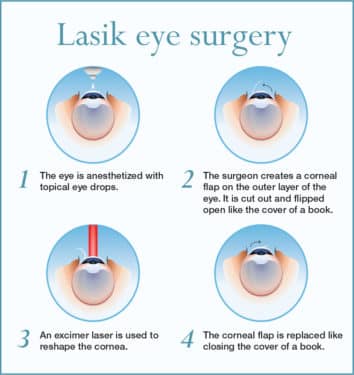Frequently Asked Questions Regarding Lasik Eye Surgical Procedure

Content by-Lynge Ryan
Prior to LASIK, your eye specialist will certainly evaluate your vision to make sure it is secure. He or she will certainly additionally check to see if you have any other eye issues that might influence your results.
After the eye doctor has actually applied numbing eye decreases, he or she will produce a paper-thin flap in your cornea cells making use of a gadget called a microkeratome or laser. The procedure is pain-free.
What Is LASIK?
LASIK is a sort of refractive surgery. It remedies vision problems triggered by refractive mistakes, which occur when the cornea or lens do not properly bend light rays.
Lots of people who have LASIK achieve great distance vision without glasses or calls. Nevertheless, they might require reading glasses to see close up. The outcomes of LASIK are irreversible, although aesthetic adverse effects are temporary.
Can I Have LASIK if I Have Astigmatism?
Fuzzy vision is typically caused by astigmatism. LASIK can help with this issue by making your cornea a lot more balanced. The cosmetic surgeon will utilize a device called a microkeratome or laser to reduce a thin flap in your cornea, after that fold it back. They will certainly then utilize a laser to improve the cornea so it can bend light much better.
The only thing that LASIK can not do is correct presbyopia (age-related farsightedness). This can only be made with cataract surgical treatment.
Can I Have LASIK if I Have Dry Eye?
A vital part of the LASIK evaluation is examining exactly how well your eyes generate tears. Some individuals with completely dry eye are unable to get LASIK due to the fact that it can intensify the condition.
Dry eye is a common adverse effects of LASIK due to the fact that the treatment severs corneal nerves. However, it generally boosts as the eye heals. You can use artificial tears and also punctal plugs to manage your signs and symptoms.
Can I Have LASIK if I Have a Cataract?
In many cases, yes. LASIK can enhance your vision after cataract surgical procedure.
When you have a cataract, your lens is over cast and your close-up vision is blurry. LASIK can aid with this, as well as your range vision.
Throughout LASIK, your cosmetic surgeon will utilize a laser or a blade to create a thin flap on your cornea. After that the doctor will certainly fold the flap back and also use a laser to improve your cornea.
Can I Have LASIK if I Have a Retinal Detachment?
Retinal detachment normally arises from a retinal tear. The doctor will repair the tear with an in-office procedure called pneumatically-driven retinopexy. After the eye is numbed, the doctor inserts an expanding gas bubble into the eye to push the removed retina against its assistance tissue.
LASIK doesn't appropriate presbyopia, which establishes as you grow older as well as creates blurry close-up vision. Nonetheless, it can be integrated with mono-vision to minimize or remove the demand for checking out glasses.
Can I Have LASIK if I Have a Hyperopia (Farsightedness) or Nearsightedness (Nearsightedness)?
Most medical insurance firms do not cover LASIK due to the fact that it isn't taken into consideration clinically necessary. Nevertheless, they might reimburse clients for lens implants if a doctor becomes part of their network.
Before you go through LASIK, your ophthalmologist will certainly execute an extensive eye examination. https://zenwriting.net/le65juliana/common-misconceptions-about-lasik-eye-surgical-procedure-debunked will certainly include checking your general eye health and wellness, pupil size and also refractive mistake. She or he will certainly also measure the thickness of your corneas.
Can I Have LASIK if I Have Presbyopia (Aging Eyes)?
LASIK does not attend to presbyopia (loss of close to vision related to age). Instead, click the up coming website page deals with refractive mistakes by improving the cornea.
After numbing decreases as well as covering the eye with a shield or spot, the surgeon produces the flap. Then the laser improves the cornea. You may listen to a clicking sound as well as smell an uncommon scent. This is regular and does not trigger damage.
Can I Have LASIK if I Have Keratoconus (Curved Cornea)?
In LASIK, your surgeon will utilize a femtosecond laser to cut a slim flap in the cornea. They will certainly then fold it back as well as use a different laser to improve your cornea.
Your vision is based on how light enters your eye, flexes with the lens and focuses on the retina. Refractive errors maintain light from concentrating correctly as well as cause blurry vision.
Can I Have LASIK if I Have Blepharitis (Inflammation of the Eyelids)?
A lot of clients choose LASIK due to the fact that they want flexibility from glasses or call lenses. It is important to discuss your objectives with your eye doctor before having the procedure.
https://squareblogs.net/sharron119sanford/recognizing-the-lasik-eye-surgical-treatment-treatment-step-by-step is not agonizing. Eye decreases are positioned to numb your eyes prior to the surgery. Many clients explain really feeling a mild pressure yet no discomfort. Recovery from LASIK is fairly fast. Your vision will certainly be a little fuzzy and light sensitive right after surgical treatment yet should enhance rapidly.
Can I Have LASIK if I Have a Corneal Thickness Problem?
LASIK fixes vision by improving the corneal tissue. To do this, the cornea should be thick sufficient for the surgeon to create a flap.
If your corneas are as well thin, you might be a candidate for laser vision improvement procedures that do not need creating a flap, such as PRK or Epi-LASIK. These treatments have comparable outcomes to LASIK however work in a various way.

